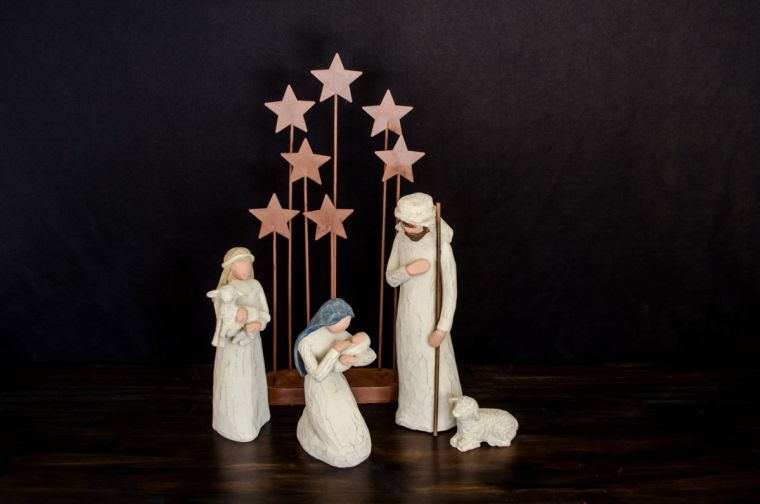Mary's obedience in carrying the baby Jesus has so much to teach us

I simply can't understand how Roman Catholics can talk of Mary as if she was born without sin. It certainly isn't found in the Biblical text. But the more I reflect on this remarkable young girl's story the more I am reminded that we must be careful not to throw the mother out with the bathwater either, so to speak.
The angel Gabriel certainly didn't say that she was "full of grace". Jesus was full of grace of course, and the author of Acts tells us that it was true of the first Christian martyr (Stephen) also. He simply told this remarkable young teenager that God was being incredibly kind to her and was offering her the chance to play a crucial part in His remarkable rescue plan. That's why the best translations talk of her "finding favour with God" with the emphasis on God's grace rather than Mary's virtues.
But while all this is true, this "mother made by her own child" (to quote singer songwriter Michael Card) has a lot to teach us. And the implications can prove quite revolutionary too.
Let's consider her sex. In many ways, Mary was a 'nobody'. She was a young woman, living in the often despised town of Nazareth but God took her seriously because she was created in His image. That means He loved her, valued her and wanted to use her even though she was not a man.
Sadly that has not always been the case, even in the church. We forget that when the Bible tells us that when God created "Adam" in His own image, He created him male and female, or to quote Emil Brunner He "created him as man and woman". But if this is true then Christians especially should operate on the understanding that both men and women enjoy equal dignity and should experience equal opportunities too. Women are not inferior males.
This has not always gone down well in some circles of course. Indeed just a few weeks ago, Sarah Baxter could write in the Sunday Times, "The hard won equal rights for women that have taken more than a century to establish are still fragile. Those rights have already been reversed with dire consequences for women in parts of the world."
In the same way, the BBC reported this week that, according to the World Economic Forum. it is going to take another 99.5 years for women to be on equal footing with men, and tragically the UK has slipped from 15th to 21st place in its ranking. Viewed from this perspective, it seems that God is far happier using women than the men who are supposed to behave like Him!
But it's not just women of course. "Mary's boy child" went on to demonstrate that we should treat everyone with compassion and dignity, whatever their background or nationality even if that goes against the grain of the prevailing political correctness. The early church clearly understood this as we see from Peter's acceptance of the Roman centurion Cornelius, Philip's baptism of an Ethiopian eunuch and Paul's instruction to Philemon that he should view the slave Onesimus as his brother. He summed it up best when he told his friends in Galatia that in Christ, "There is no longer Jew or Gentile, slave or free, male or female." If only His people would live up to this wonderful challenge!
It's worth remembering that if you are a Christian, challenge is par for the course. Mary certainly reminds us of that. I can't even begin to think of what went through her mind as she contemplated Joseph's reaction to her explanation for her pregnancy. And of course there was the wider family and the neighbours to think of. She must have realised that she was facing the very real possibility of public humiliation and that she might well be divorced and disowned . I wonder how many of us would be as willing to let God use us if we knew we could well lose our reputation, our family and our closest friends.
But Mary was clearly up for it because we read that she told the angel that she as the Lord's servant (or slave) was willing to do anything He wanted her to do. Put simply then Mary teaches us that we can't say "No Lord". For if He is Lord we can't say "No", and if we say "No" we are clearly showing Him that He is not our Lord!
Mary said "Yes", and as a result discovered that God can do the seemingly impossible.
I have discovered that time and time again too. He might be the God of the "predictably unpredictable" but He is also the God of the "naturally supernatural".
Yet in spite of this, He wants to involve flawed, insignificant nobodies like us, not because He has to and certainly not because we are good enough. It's because He is "full of grace" and wants us to discover our God-given purpose too.
Rob James is a Baptist minister, writer and church and media consultant to the Evangelical Alliance Wales. He is the author of Little Thoughts About a Big God.











